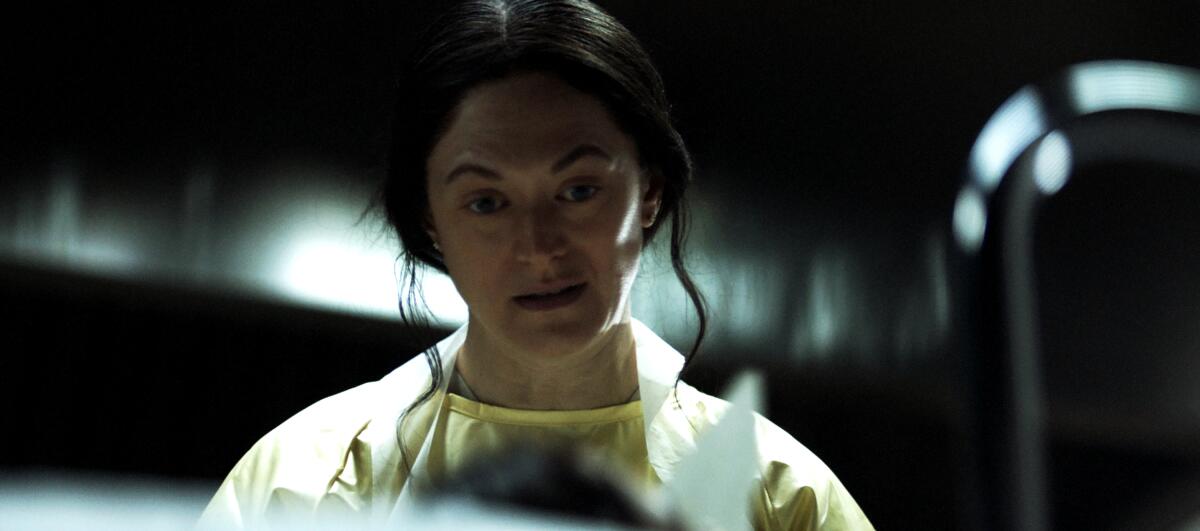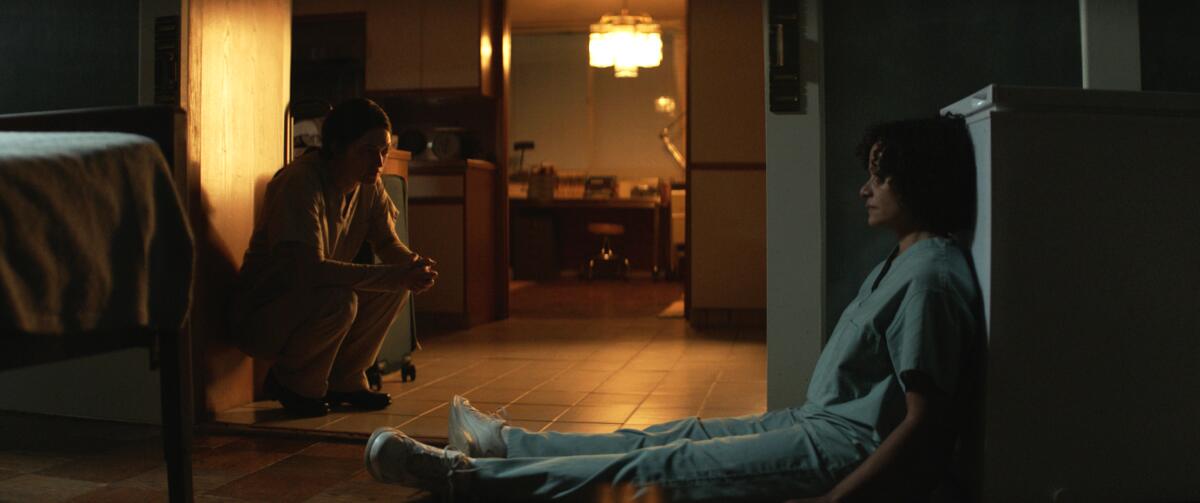Back in the horror laboratory, ‘birth/rebirth’ is alive (alive!) with female tensions

- Share via
Bodies make sense to morgue technician Rose (Marin Ireland) — it’s people that don’t. A pathologist in a Bronx hospital, the socially awkward Rose is comfortable with death, almost flippant about it. It’s a requirement for the job, but she isn’t like the other techs, plunging her hand into the bloody incision bisecting the abdomen of a deceased pregnant woman, extracting what she’s looking for with a brutal, emotionless efficiency.
Despite her ease with death, and as an outgrowth of her desire to understand and exert control over the human body, Rose also has an overwhelming drive to create life. Naturally, she has an odd way of going about it, and thus unfolds “birth/rebirth,” the shocking, disturbing and ultimately fascinating debut from director and co-writer Laura Moss.
Pursuing her goal with a single-minded intent leads Rose into a strange alliance with obstetrics nurse Celie (Judy Reyes), her temperamental and professional opposite. The gentle, empathetic and intuitive Celie has dedicated her career to bringing life into the world, and in the wake of a personal tragedy, she finds herself in an unconventional relationship with Rose, the two women tied together while working to achieve an uncanny outcome.
There is a chilly gruesomeness to Moss’ modern, medical take on Mary Shelley’s “Frankenstein,” and a decidedly feminist ethos in its approach to motherhood, maternity and women’s bodies, toggling uneasily between the clinical and the emotional. Rose’s relationship to her own body is similar to the way she sees the dead bodies in her lab: merely functional, something to be used, extracted from, harvested. If everyone around her is a specimen in her experiment, so is she.

What brings Celie into Rose’s twisted orbit is the sudden death of her daughter, Lila (A.J. Lister), from bacterial meningitis. When Lila’s small corpse arrives in Rose’s care, she doesn’t see the end of life but rather opportunity. Out of her mind with grief, Celie aligns herself with Rose’s experiment to bring Lila back to life, using biological material from fetal tissue and pregnant women, including Rose herself, and the anxious, unknowing Emily (Breeda Wool).
“birth/rebirth” relies on the queasy, unsettling nature of its ideas to draw out the inherent horror of this story: the blurring of boundaries between life and death; the way Rose treats every human being who crosses her path like a cadaver; how easily Celie is able to harm innocent people when what she wants feels more important than anything else. Moss doesn’t juice the style to lead the audience, though there is an eerie, high-contrast look to Rose’s dark basement lair, and Lisa Forst’s realistically gooey and crimson special makeup effects are starkly presented. Moss relies on the existential dread of the script, co-written with Brendan J. O’Brien, and the performances by veteran actors Ireland, Reyes and Wool.
This is a showcase for bravura acting, with Ireland playing Rose as aggressive and stilted in her inability to connect with others, or even present a normal social interaction. Reyes conveys Celie’s deep-feeling nature with grace, and then shows how that performance of empathy can be weaponized toward a nefariously selfish end. Wool is heartbreakingly vulnerable in her desire to have a healthy child — though ultimately that’s what every character in this film wants, despite their disparate ways of achieving that.
Moss boldly harnesses Shelley’s classic story — often deemed the first horror-science-fiction novel — to radically feminist ends in “birth/rebirth,” exploring the creation of life with a daringly scientific approach, divorcing conception from the spiritual narrative that has been laid atop it. In teasing out the complex relationship between life and death in relationship to birth and “Frankenstein,” Moss presents a provocative quandary, and reminds us that horror stories have been women’s stories all along.
Katie Walsh is a Tribune News Service film critic.
'birth/rebirth'
Rating: R, for disturbing material and gore, some sexual content, language and nudity
Running time: 1 hour, 38 minutes
Playing: General release
More to Read
Only good movies
Get the Indie Focus newsletter, Mark Olsen's weekly guide to the world of cinema.
You may occasionally receive promotional content from the Los Angeles Times.









